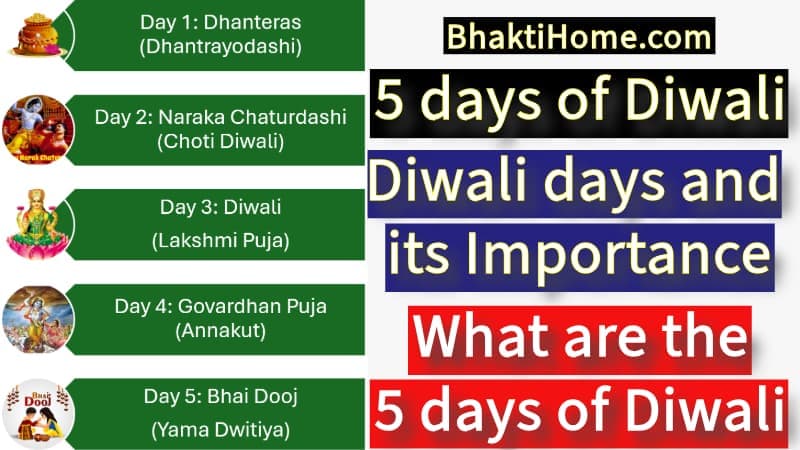
5 days of Diwali - Diwali, the Festival of Lights and also known as Deepavali/Deepawali, is a five-day celebration filled with vibrant rituals, spiritual practices, and joyous family gatherings.
5 days of Diwali | Diwali days and its importance
Each day of Diwali holds unique significance, from Dhanteras to Bhai Dooj, honoring various deities and symbolizing themes of prosperity, victory, and familial love. This comprehensive guide explores the importance of each day, including traditional rituals and practices, and offers step-by-step insights into how to celebrate Diwali with devotion and joy. Whether you’re looking to understand the story behind each day or wish to follow each ritual correctly, this guide helps you embrace the spirit of Diwali fully.
Day 1: Dhanteras (Dhantrayodashi)
Dhanteras Importance
Dhanteras marks the beginning of Diwali celebrations. It is believed that on this day, Lord Dhanvantari, the god of Ayurveda, emerged with the elixir of life. This day is dedicated to prosperity, health, and wealth, and people buy new items, especially metal objects, as a symbol of good fortune.
What to Do on Dhanteras
- Purchase Gold or Silver: Buying precious metals on this day is considered auspicious.
- Clean and Decorate the House: Sweep and clean the home thoroughly to prepare for the arrival of Lakshmi.
- Light Diyas: Place diyas (small lamps) at the entrance to ward off negative energies.
- Perform Dhanteras Puja: Worship Lord Dhanvantari and Goddess Lakshmi with flowers, fruits, and sweets, and recite prayers for good health and prosperity.
- Importance of Financial Investments: Many also invest in stocks or business assets, as it’s believed this day is ideal for starting new ventures.
Day 2: Naraka Chaturdashi (Choti Diwali)
Naraka Chaturdashi Importance
Naraka Chaturdashi, also known as Choti Diwali, symbolizes the victory of Lord Krishna over the demon Narakasura. It’s a day to release negative energies and start anew with positivity.
What to Do on Choti Diwali
- Abhyanga Snan (Oil Bath): Begin the day with an oil bath, using sesame oil, which is believed to cleanse and purify.
- Decorate with Rangoli: Create beautiful rangoli designs at the entrance of your home, which attract prosperity and happiness.
- Light Diyas Around the House: Illuminate the entire house with lamps and diyas to signify the victory of light over darkness.
- Offer Prayers to Yama (God of Death): Some families perform rituals for Lord Yama to pray for protection and longevity.
- Perform Lakshmi Puja in the Evening: Although the grand Lakshmi Puja happens on the main Diwali day, a simple offering with flowers and incense can be done on Choti Diwali as well.
Day 3: Diwali (Lakshmi Puja)
Lakshmi Puja Importance
The third day, Diwali, is the main day of the festival and is dedicated to Goddess Lakshmi, the deity of wealth and prosperity. It also commemorates Lord Rama’s return to Ayodhya after his 14-year exile and the victory of good over evil.
Also read - लक्ष्मी पूजन विधि मंत्र सहित | Lakshmi pujan vidhi with mantra
What to Do on Lakshmi Puja/Diwali
Prepare for Lakshmi Puja: Clean and decorate the home with flowers, lights, and rangoli.
Read - Lakshmi pooja items list and Lakshmi puja samagri list
- Place Diyas Everywhere: Arrange diyas around the house, especially at entrances and windows, to invite Goddess Lakshmi.
Perform Lakshmi-Ganesha Puja: Worship Goddess Lakshmi and Lord Ganesha with offerings of sweets, fruits, incense, and flowers. Chant mantras dedicated to both deities for blessings.
- Exchange Gifts and Sweets: Share sweets and gifts with family and friends as a symbol of joy and unity.
- Firecrackers: In some regions, people light firecrackers to celebrate the day. However, environmentally friendly options are encouraged to reduce pollution.
Day 4: Govardhan Puja (Annakut)
Govardhan Puja Importance
Govardhan Puja celebrates Lord Krishna lifting Mount Govardhan to protect the villagers from a storm sent by Lord Indra. This day signifies gratitude for nature’s bounty and the protection provided by divine powers.
What to Do on Govardhan Puja
- Prepare Food Offerings (Annakut): Cook a large variety of vegetarian dishes and offer them to Lord Krishna as a mark of gratitude.
- Build a Small Govardhan Hill: Some devotees create a small replica of Mount Govardhan using cow dung, symbolizing Krishna’s act of lifting the hill.
- Worship Lord Krishna: Offer flowers, sweets, and incense to Lord Krishna and recite the Govardhan Puja mantras.
- Family Meal and Gratitude Rituals: Families often come together for a meal to express gratitude and seek blessings for abundance and prosperity.
Day 5: Bhai Dooj (Yama Dwitiya)
Bhai Dooj Importance
The final day of Diwali, Bhai Dooj, celebrates the bond between brothers and sisters. It is believed that on this day, Yama, the God of Death, visited his sister Yamuna. The festival symbolizes the blessings of protection and love between siblings.
What to Do on Bhai Dooj
- Sister’s Blessing Ritual: Sisters invite their brothers for a meal, apply tilak on their foreheads, and perform a small aarti for their well-being.
- Brother’s Gift of Gratitude: Brothers give gifts or money to their sisters as a symbol of love and gratitude.
- Family Gathering: Families come together to celebrate, share meals, and exchange sweets.
- Prayers for Protection: Sisters pray for the health and protection of their brothers, and in some customs, brothers also perform rituals to express gratitude for their sisters.
Conclusion - 5 days of Diwali
Each day of Diwali holds a unique significance, from invoking wealth and prosperity to celebrating sibling bonds. Observing these rituals not only deepens spiritual connection but also enriches relationships and strengthens family ties.
Following these practices helps ensure an auspicious and joyous celebration for everyone involved.

